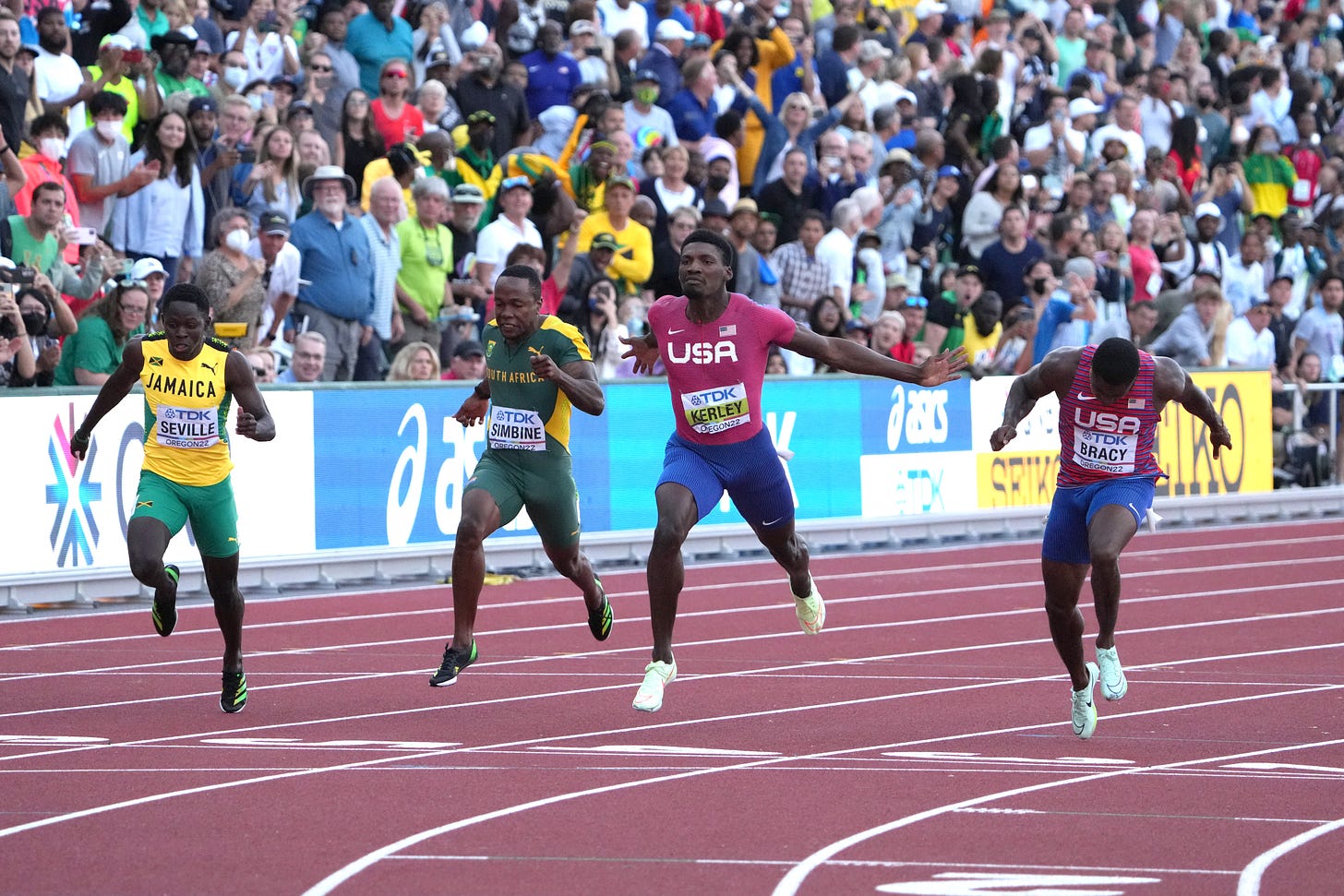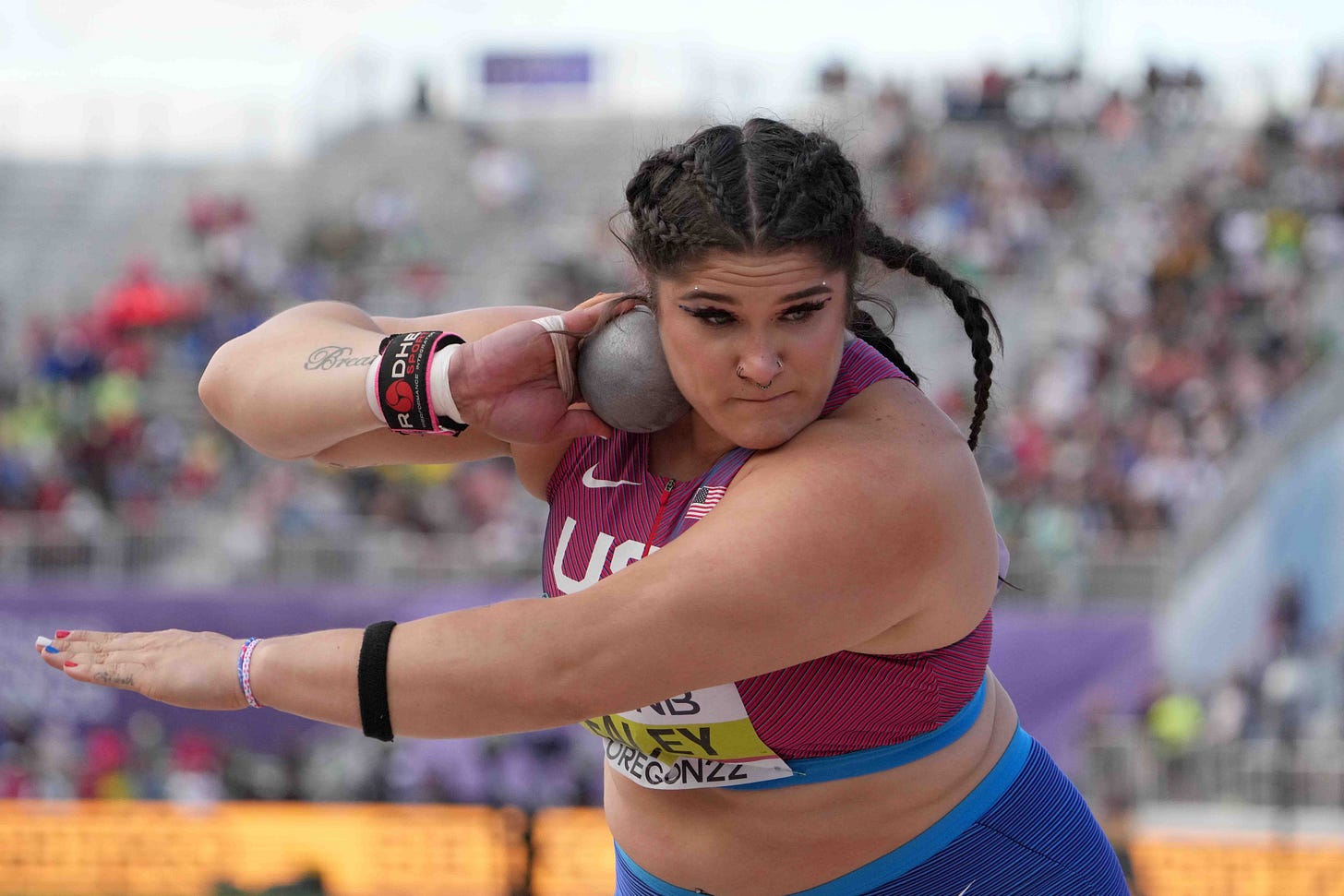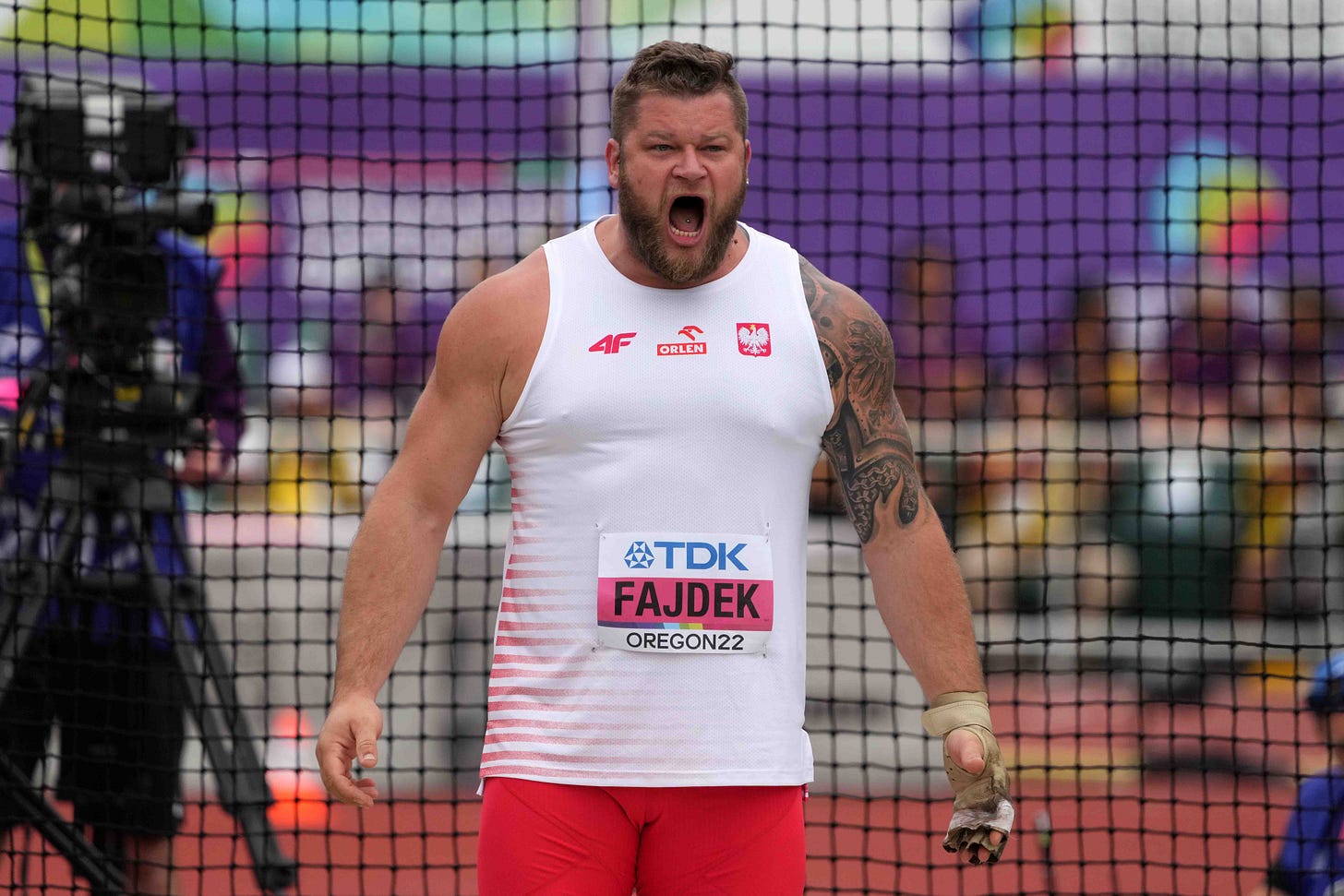Come-from-behind victory is crowning achievement
Kerley wins 100 meters to lead U.S. to 1-2-3 finish in World Championships

EUGENE, Oregon – Fred Kerley has run faster races than he did in the final of the men’s 100 meters in the World Athletics Championships at the University of Oregon’s Hayward Field on Saturday evening.
And he has turned in smoother and more technically sound performances. But he has never had a bigger victory than the one he registered Saturday when he came from behind to win a hotly contested race while leading the U.S. to a 1-2-3 finish.
Kerley ran 9.86 seconds to edge teammates Marvin Bracy and Trayvon Bromell, who both clocked 9.88.
It was the first time since the 1991 World Championships in Tokyo that the U.S. – led by a then-world record performance from Carl Lewis – had swept the medals in the men’s 100.
“When I got second at the Olympics last year, I said, it can’t happen again,” Kerley told Lewis Johnson of NBC Sports. “So I came out with the gold medal at the end of the day.”
Kerley, 27, had been ranked among the top five 400-meter sprinters in the world by Track & Field News from 2017-19, and he won a bronze medal in that event in the 2019 World Championships in Doha, Qatar. But he raised some eyebrows last year when he ran the 100 and 200 in the U.S. Olympic Trials, rather than the 400, which was considered his best event.
Those questioning his move got more fodder for their criticism when he placed third in the 100 and fourth in the 200 in the Olympic Trials. However, he went on to win the silver medal in the 100 in the Olympic Games in Tokyo with a personal best of 9.84, finishing behind surprising Italian Marcell Jacobs, who ran a European record of 9.80.
Kerley’s clocking in the Olympics remained his personal best entering the USA Track & Field Outdoor Championships in late June, but he ran 9.83 in the first round of that meet and 9.76 in a semifinal before easily winning the final in 9.77.
When he ran 9.79 in his first-round heat on Friday, it did not seem unreasonable to think he could run faster in the final while posting a runaway victory.
That expectation dimmed a little earlier in the day Saturday when he ran 10.02 to edge defending World champion Christian Coleman by three hundredths of a second in a semifinal. And 80 meters into the final, it looked like Kerley might end up third in a 1-2-3 U.S. sweep. But he passed Bromell with 10 meters left in the race, and edged ahead of Bracy in the last six or seven meters before leaning across the finish line.
“I saw Marvin breaking at the last 20 meters,” Kerley said. “He dipped before me. But at the end of the day, we got a USA sweep.”
It was interesting to watch a replay of the race as Kerley, running in lane four, appeared to come out of the starting blocks ahead of Bracy in lane three. But Bracy passed Kerley about 40 meters into the race and it wasn’t until 30 meters later that Kerley started to make a dent in his fellow American’s advantage. Meanwhile, Bromell was matching strides with Bracy while running out of lane eight.
Kerley’s initial reaction after crossing the finish line led you to think he was sure he had won. But it wasn’t until several seconds later when he was listed as the winner of the race on a video scoreboard that Kerley smiled broadly and ran down the backstretch while motioning to the crowd that was cheering for him.
His impromptu victory lap continued around the second turn as he slapped hands with numerous fans who were reaching out to him as he jogged past in lane nine.
Bracy, who won his first World Championships medal outdoors, told Johnson the U.S. sweep meant everything to him.
“This is special,” he said. “With the Champs being at home, it was only right that we come out here and sweep it.”
Coleman, who got off to his usual strong start, was in the running for a medal 60 meters into the race, but he finished sixth. Jamaican Oblique Seville placed fourth in 9.97 and South African Akani Simbine was fifth in 10.01, the same time given to Coleman.
Jacobs had withdrawn from his semifinal race because of injury issues that had limited his racing since late May.
Echoing Bracy, Kerley said the U.S. sweep was important, and made a remark that is sure to perk up ears in the sprint camps of countries such as Jamaica.
“It means a lot going forward,” he said. “We plan on doing this year in and year out.”
Kerley’s victory came within 10 minutes of fellow American Chase Ealey winning the women’s shot put and Jianan Wang of China moving from sixth place to first on his final leap of the long jump competition.
Ealey, who entered the meet with the best put in the world this year at 20.51 meters (67 feet 3½ inches), unleashed a 20.49 (67-2¾) effort on the first put of the competition. But the 27-year-old was unable to improve on that mark on her final five efforts as Olympic champion and two-time defending World champion Lijiao Gong of China had puts of 20.23 (66-4½), 20.08 (64-10½), and 20.39 (66-10¾) in the third, fourth, and fifth rounds.
Ealey had a 20.07 (65-10¼) effort in round four, but it wasn’t until Gong’s final put was short of 20 meters that she could celebrate becoming the first U.S. woman to win a World Championships title in the shot put.
“It sounds amazing,” she said of nearly matching her personal best in the first round. “But knowing these girls, I didn’t think it was going to be [good enough to win], but it was.”
Jessica Shilder of the Netherlands and Sarah Mitton of Canada each had bests of 19.77 (64-10½), but Shilder was awarded the bronze medal because she had a second 19.77 put that was further than Mitton’s second-best effort of 19.18 (62-11¼).

Wang was in sixth place after the first five rounds of the men’s long jump as his best of 8.02 (26-3¾) was well short of that of first-place Miltiadis Tentoglou of Greece, who had jumps of 8.32 (27-3¾), 8.30 (27-2¾), 8.29 (27-2½), and 8.24 (27-0½).
However, he uncorked a season best of 8.36 (27-5¼) on his final jump, and when Tentoglou’s final leaped measured 8.20 (26-11), Wang became the first Chinese man to win the long jump in the World Championships.
In finals held during the morning session Saturday, Pawel Fajdek of Poland won his fifth consecutive title in the men’s hammer throw and Letesenbet Gidey of Ethiopia won her first title in the women’s 10,000 meters.
Fajdek’s victory was not an easy one as the 33-year-old had to come from behind to win.
He was in ninth place after the first round with a toss of 74.71 (245-1), but moved into first when he had an 80.58 (264-4) effort in round two. A thrower later, Eivind Henriksen of Norway took over the lead when he hit 80.87 (265-4).
Fajdek fell into third place at the start of the third round when countryman and Olympic champion Wojciech Nowicki unleashed a throw of 81.03 (265-10). But he took the lead for good when he had a toss that measured 81.98 (268-11), the best throw in the world this year.
Fajdek, who became one of three athletes to have won five or more titles in a single event in the World Championships, got down on his hands and knees and kissed the concrete discus circle after his final throw of the competition. He did likewise when he was about to step onto a platform to receive his gold medal.
Nowicki finished second at 81.03 (265-10) and Henriksen was third at 80.87 (265-4).
It was a noteworthy competition as the top five finishers all bettered 80 meters.

Gidey’s victory was particularly satisfying to her as she had finished a disappointing third in the Olympic Games last summer after leading all but the final 100 meters of the last seven kilometers of the race.
She ran in the pack for much of the race on Saturday before she and countrywoman Ejgayehu Taye began to work together with seven laps left. Their efforts had whittled down the lead pack to nine runners with two kilometers remaining and that number had decreased to six with a lap left.
Gidey, who holds the world record in the 5,000 and 10,000, had the lead at that point and she steadfastly refused to give it up.
She was closely pursued by Kenyans Hellen Obiri and Margaret Kipkemboi, and Olympic champion Sifan Hassan of the Netherlands coming out of the final turn, but none of them were able to overtake Gidey, who crossed the finish line in a yearly world-leading time of 30:09.94.
Obiri and Kipkemboi finished second and third in personal bests of 30:10.02 and 30:10.07, respectively.
Hassan, who had sped past Gidey on her way to victory in the Olympics, placed fourth in 30:10.56.

In qualifying races on Saturday, Dina Asher-Smith of Great Britain and Shelly-Ann Fraser-Pryce of Jamaica had the two fastest first-round times in the women’s 100 at 10.84 and 10.87.
Grant Holloway of the U.S., Norah Jeruto of Kazahkstan, and Faith Kipyegon of Kenya were some of the other high-profile performers who ran in qualifying heats.
Holloway ran 13.14 to post the fastest time in the 110-meter high hurdles. But countryman Daniel Roberts, a potential medalist, banged the seventh hurdle in his heat and never made it over the eighth one.
Jeruto, a native of Kenya, won her heat of the 3,000-meter steeplechase in a particularly fast time of 9:01.54, and two-time Olympic champion Kipyegon won her 1,500-meter semifinal in 4:03.98.
All of the major contenders, including world-record-holder and Olympic champion Karsten Warholm of Norway, advanced to the semifinals of men’s 400-meter intermediate hurdles.
Warholm, who ran 49.34, was competing in his second race of the year after failing to finish his season opener because he sustained a small tear of his right hamstring after going over the first hurdle.
Stewart McSweyn of Australia ran 3:34.91 in the 1,500 to post the fastest first-round time in that event. Olympic champion Jakob Ingebrigtsen of Norway placed third in that heat with a time of 3:35.12.
Yulimar Rojas of Venezuela, the world-record-holder and Olympic champion in the women’s triple jump, led qualifying in that event with a mark of 14.72 (48-3½).



